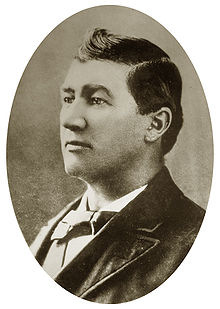Denis Kearney | |
|---|---|
 | |
| Born | 1846 or 1847 or 1848 Oakmount, County Cork, Ireland |
| Died | 1907 |
| Nationality | Irish |
| Occupation(s) | Drayman and labor organizer |
| Spouse | Mary Ann Leary |
Denis Kearney (1847–1907) was a California labor leader from Ireland who was active in the late 19th century and was known for his anti-Chinese activism.[1][2] Called "a demagogue of extraordinary power,"[3] he frequently gave long and caustic speeches that focused on four general topics: contempt for the press, for capitalists, for politicians, and for Chinese immigrants. A leader of the Workingmen's Party of California, he is known for ending all of his speeches with the sentence "And whatever happens, the Chinese must go" (a conscious inspiration from Roman senator Cato the Elder's fame for ending all speeches with ceterum autem censeo Carthaginem esse delendam – "Furthermore, I consider that Carthage must be destroyed".)[4]
Kearney was part of a short-lived movement to increase the power of the working class, but after a few years his increasingly vitriolic language and his repeated arrests for inciting violence alienated many of those whom he was trying to influence. When the economy grew stronger in the early 1880s, Kearney faded from public notice. He started an employment agency where he worked until his health began to fail around 1900. He died in Alameda, California, in 1907.
- ^ "Denis Kearney". Retrieved 2012-07-02.
- ^ Seligman, Scott (2013). The First Chinese-American: The Remarkable Life of Wong Chin Foo. Hong Kong University Press. ISBN 978-9888139903. p. 111:
If any one individual personified the anti-Chinese movement in the United States, it was surely San Francisco's Denis Kearney. A bigot, a demagogue, and a gifted public speaker, Kearney rose to prominence in the late 1870s....
- ^ Charles J. McClain, In Search of Equality: The Chinese Struggle Against Discrimination in Nineteenth-Century America. Berkeley: University of California Press, 1994; p. 79.
- ^ Andrew Gyory, Closing the Gate: Race, Politics and the Chinese Exclusion Act. Chapel Hill, NC: University of North Carolina Press, 1998; p. 111.
